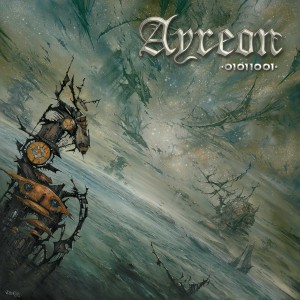01011001
| 01011001 | ||||
|---|---|---|---|---|
 |
||||
| Studio album by Ayreon | ||||
| Released | 25 January 2008 | |||
| Recorded | April - November 2007 | |||
| Genre | ||||
| Length | 102:16 | |||
| Label | InsideOut Music | |||
| Producer | Arjen Lucassen | |||
| Ayreon chronology | ||||
|
||||
| Arjen Anthony Lucassen chronology | ||||
|
||||
| Professional ratings | |
|---|---|
| Review scores | |
| Source | Rating |
| About.com | |
| Allmusic | |
| Dangerdog.com | |
| Melodic.net | |
| Metal Storm | |
| Metal Storm (2) | |
| Record Collector | |
01011001 is the seventh studio album by Arjen Anthony Lucassen's long-running Ayreon project. "01011001" is the binary representation of the ASCII value of the letter Y.
Seventeen singers in total (including Lucassen himself) contributed to the album, more than any other Ayreon album. Of these, except Lucassen, only Anneke van Giersbergen (ex-The Gathering) and Floor Jansen (After Forever, Nightwish) have sung on previous Ayreon albums: van Giersbergen on Into the Electric Castle, Jansen on The Dream Sequencer.
It also stars, among others, Bob Catley from Magnum, Hansi Kürsch from Blind Guardian, Jørn Lande, and Steve Lee from Gotthard in his final guest appearance before his death in 2010; overall, it stars seventeen lead vocalists, more than any other Ayreon album. The album was a commercial and critical success.
Through technological advancement, 'Forever', a race of aquatic beings living on Planet Y, has found the secret of longevity. They have advanced to the point that they have become completely dependent on machines and are losing their emotions. A passing comet on a collision course with Planet Earth provides the opportunity to revitalize their race; 'Forever' harness the comet to carry their DNA to a new home on Earth. When the comet and Earth collide, the cataclysmic impact exterminates the dinosaurs (the Fifth Extinction), but from the ashes of destruction, humans arise. At first, the experiment with seeded DNA seems successful: through the humans 'Forever' vicariously relive the emotions they experienced before the age of machines. In order to help mankind overcome their physical ailments and mental limitations, 'Forever' speeds up human evolution. But the result is tragic: people develop a similar technological dependency with their emotions waning just like 'Forever' and moral development not keeping pace with their capacity to invent. 'Forever' must find a way to save mankind from its imminent self-destruction… or should they?
...
Wikipedia
